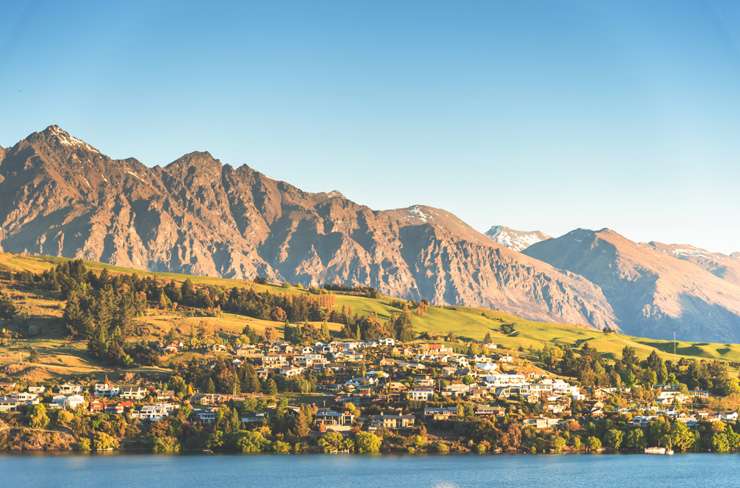Some agents who work at the upper end of the housing market are hoping the removal of the foreign buyer ban will be added to National’s list of policy adjustments should they form the government after the election.
No one OneRoof spoke to thought overturning the ban would make much difference to prices in the low and middle price bracket, but said prices at the top could rise.
National leader Christopher Luxon today refused to rule out overturning the ban, which was brought in by Labour in 2018 after international buyers were perceived to be snapping up homes ahead of local buyers.
Luxon said on TVNZ Breakfast that the party would have more to say on the issue "very shortly".
Start your property search
Last month Housing spokesman Chris Bishop said in a statement to OneRoof that National had so far committed to changing Labour policy on these fronts:
• Restoring full interest deductibility for rental properties;
• Taking the bright-line test back to two years (from 10);
• Reintroducing 90-day notice periods for tenants; and
• Changing the automatic roll-over of fixed-term tenancies into periodic tenancies.
“We have also launched our ‘Going for Housing Growth’ policy, which is a comprehensive suite of measures across land supply, infrastructure and incentives for councils to boost housing supply in New Zealand.”
Bishop did not answer what National’s stand on the foreign buyer ban was, saying only that further policy announcements would be made in due course.
Chris Farhi, Bayleys head of insights, says the most significant policy change would be the restoration of interest deductibility for landlords. “We think if that's changed it would likely reignite that residential investment market so we'd see a big tranche of investors re-enter.”
If foreign buyers were allowed to again buy existing housing, there could be an impact on the market because there would be more people who could potentially buy, but the scope of that impact would likely be more limited than it might have been three or four years ago.
That’s partly because some countries, most notably China, have put controls around the flow of capital out of the country, Farhi says.
“If you go back five or six years ago it was reasonably straightforward for mainland Chinese to take capital from China and invest it in other countries, whereas what's happened over time is the government over there has tightened the ability to move capital into other countries.”
Also, globally a lot of property markets are calming down and that slowdown probably means a reduction in demand from overseas buyers, although New Zealand is still known as a safe place to invest, Farhi says.
Reversing the ban in itself was unlikely to make much difference, however, it could play a part in among other measures. “I'd say you're not going to see a doubling of house prices overnight because of it but you would see a general increase in demand.”
Ray White economist Nerida Conisbee says New Zealand could use foreign buyers to its advantage by restricting them to only buying new properties to rent out as that would increase the supply of rentals, and it could also kickstart bigger projects.
“For example, developers of apartment buildings often require a certain amount of pre-sales before they start building,” she says.
Read more:
- Mortgage anxiety intensifies: How Kiwi borrowers got caught out by rates shift
- $1 reserve triumph: ‘Worst house on the best street’ sells for $510,000
- Tony Alexander: FOMO's back - why Auckland is primed to lead the next house price surge
“Historically, foreign buyers have provided enough of these initial sales which has not only increased the amount of rental properties but also increased total housing stock.
“Greater supply of housing makes housing more affordable so this is also a positive.”
But allowing foreign buyers to buy existing properties is less positive as many look at the price of a property in New Zealand and compare it to their own market only to find New Zealand is favourable.
“For example, a purchaser from London may see Auckland as particularly affordable and hence pay more for a property than a local buyer,” she says.
“They may also have more to spend if they have sold in a high-priced market and are looking to buy somewhere cheaper in New Zealand.
“My recommendation is for the National to use foreign buyers to make it cheaper and easier for New Zealanders to buy and rent.”
John Greenwood, a recreational real estate specialist with Bayleys, thinks the only market that would be affected by overturning the ban are the likes of people who can afford superyachts and helicopters.
“I personally do not believe it will affect house prices in the general residential market, meaning in Auckland and what have you,” he says.
“It's not going to flood people in and they're going to buy everything and lift the prices – the area it will make a difference to will be in the upper end, $5-million plus.”

National leader Christopher Luxon, left, with the party’s housing spokesman Chris Bishop. The party hasn’t ruled out overturning Labour’s foreign buyers ban. Photo / Dean Purcell

Queenstown has been a popular place for overseas buyers in the past. Photo / Getty Images
The high-end recreational market has “died” since the ban and those wealthy overseas buyers have gone elsewhere, he says. “I know there are several in Mexico, Portugal, France. They're buying in other beautiful places in the world because the governments there don't mind them spending their money.”
They will come back if the ban is overturned, because New Zealand is also a beautiful country, and Greenwood says he has a database of offshore potential buyers who like to stay informed.
These are the sorts of buyers for whom $5m-plus is a drop in the bucket: “Most of them are high net worth individuals looking for something sexy.”
Ross Hawkins, who deals in high-end properties for Ray White, says he has a “huge number” of overseas buyers on his database and knows many would buy in New Zealand if the ban was lifted, or at least eased.
“The great thing for the economy would be that the flow of funds from these overseas buyers would then create other sales as the funds they pay would then flow into the next property purchase,” he says.
“It would also give prices a lift as our dollar is low. It is a no brainer to help New Zealand get back on its feet after everything we have been through.”
New Zealand Sotheby’s International Realty managing director Mark Harris, who is based in Queenstown, agrees it’s the $5m-plus market that would be impacted but not the low or mid part of the market.
“In the higher end I think that's where the demand will come, from your wealthy international Americans and UK and Asian market.”

Ray White chief economist Nerida Conisbee says opening up New Zealand’s housing market to overseas buyers could benefit the market if done right. Photo / Supplied
There could be an impact on prices in the higher end markets around the country, such as Waiheke Island, some of the pricey Auckland properties, and in other areas like the Bay of Islands, and parts of Tauranga and Nelson.
“I think the interest is still there in New Zealand as a place to buy property, that's for sure. I wouldn't say we had a queue lining up but we'd like to see that rule reflected upon and simplified,” he says.
“I just think we're turning our back on foreign investment, which at the moment with the economy the way it is not what we want to be doing.”
Independent economist Benje Patterson, also based in Queenstown, says migration is a bigger factor in the housing market. “We have so many more people in New Zealand at present, irrespective of whether people are looking to buy or rent, we've got a lot more people chasing a housing stock that is still increasing but building consents have come down significantly from where they were 18 months ago or so,” he says.
“I don't believe overturning the foreign buyer ban - it wouldn't be the key catalyst to look out for in the housing market at present.”
- Click here to find properties for sale













































































